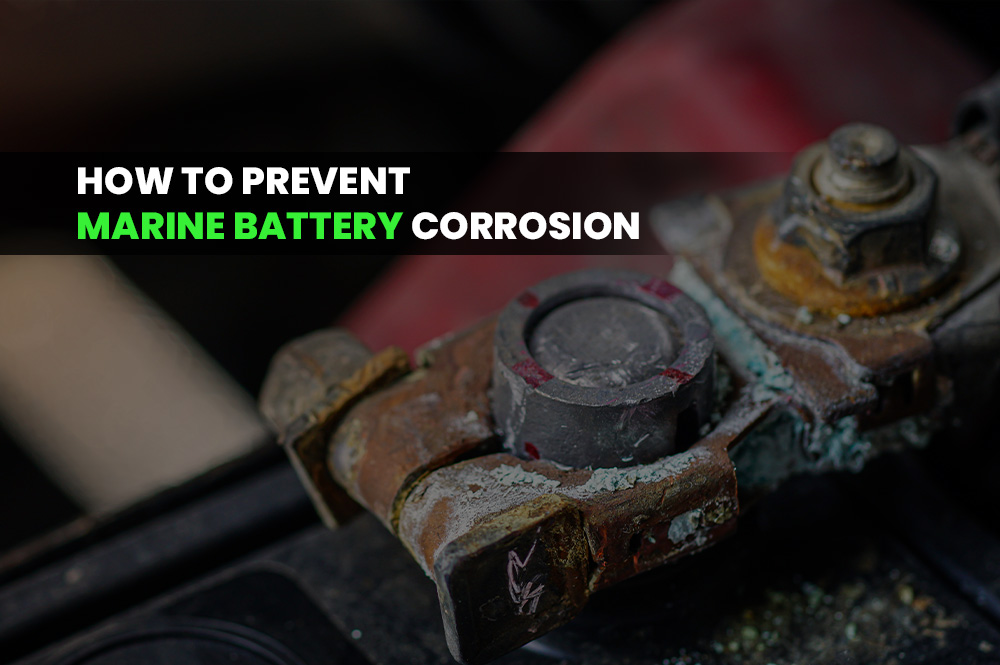How to Prevent Marine Battery Corrosion

Marine battery corrosion is a common challenge faced by boat owners, impacting both performance and safety. Get into the details on how to prevent marine battery corrosion and ensure your vessel's electrical system stays in top-notch condition.
What is Marine Battery Corrosion?
The telltale sign of marine battery corrosion is the formation of a greenish or white powdery buildup on the metal terminals. This corrosion is a result of the oxidation process triggered when the electrolyte (sulfuric acid) releases hydrogen gas, which reacts with air and moisture. Various factors, including damage, overcharging, or improper storage, can contribute to this chemical reaction, compromising the marine battery's performance and lifespan.
Preventing Marine Battery Corrosion
1. Clean Battery Terminals and Connections
Begin each boating season with a thorough cleaning of battery terminals and connections. A wire brush is an effective tool to drop accumulated dirt and debris, ensuring optimal electrical contact.
2. Apply Anti-Corrosion Spray
After the cleaning process, go the extra mile by applying an anti-corrosion spray or terminal protector. This extra layer acts as a formidable barrier against corrosion. A particularly critical measure for boats navigating saltwater environments. Where salt exacerbates the corrosive effects of moisture and other elements.
3. Check Connections
Tight marine battery terminal connections are paramount. Consider incorporating anti-corrosion pads made of fiber between the terminals and cables. This added layer serves as one more defense mechanism against the onset of corrosion.
4. Practice Proper Charging Habits
The importance of proper charging habits must be balanced. Overcharging marine batteries leads to increased hydrogen gas production, a primary contributor to corrosion. Ensure the battery's state of charge is maintained using a charger that aligns with the manufacturer's specifications.
5. Keep Batteries Clean and Dry
Regular checks, every four to six months and before storage, are necessary. Clean away any corrosion, dirt, or debris around the marine battery terminals. For storage, choose a cool, dry, and well-ventilated location by shielding batteries from saltwater, freezing temperatures, and excess humidity.
6. Consequences of Ignoring Corrosion
Ignoring the early signs of corrosion can harm a marine battery's performance. The buildup of corrosion on the battery terminals can impede the flow of electricity. By diminishing the battery's ability to hold a charge. This is a scenario no boater wants to face, especially in the middle of the ocean. Additionally, corrosion can lead to permanent damage and reduce the marine battery's lifespan necessitating more frequent replacements.
7. Professional Inspection
Regular professional inspections provide an added layer of protection. Learn why routine checks by Boat Battery Experts can catch potential issues before they escalate—ensuring a reliable electrical system.
How to Clean a Corroded Marine Battery
If signs of corrosion are evident, such as a white powdery residue or discoloration around the terminals, prompt action is essential. Clean the terminals and connections using a solution of baking powder and water, neutralizing the acidic residue. Rinse the battery with clean water and ensure it is completely dry before applying a protective spray or coating to the terminals.
Signs it’s Time to Replace Your Marine Battery
Knowing the typical lifespan of marine batteries, averaging three to four years but up to six with proper maintenance is crucial. Keep an eye out for the following signs indicating it's time to replace your marine battery from Battery Store Calgary.
1. Weak Starter Performance
If your marine battery struggles to turn the starter over when starting your outboard engine, it's a clear sign that its power is waning, and replacement is imminent.
2. Dimming Lights and Electronics
Dimming or complete outage of your boat's lighting and electronics during engine startup may indicate a battery problem, warranting consideration for a replacement.
3. Poor Battery Charge Retention
A marine battery that refuses to hold a charge is a surefire signal that its lifespan is ending. In such cases, Boat Battery Change in Calgary is the most viable solution.
4. Submerged Battery
If, by any chance, your battery becomes submerged in water, it is likely damaged beyond repair and necessitates immediate replacement.
5. Frequent Discharging
If your marine battery constantly discharges between uses, it's a clear indication that it is failing and needs to be replaced promptly.
Conclusion
Taking proactive measures to prevent marine battery corrosion and promptly addressing any signs of corrosion or battery deterioration is crucial for maintaining a boat's electrical system's reliability and extending the lifespan of marine batteries. Regular maintenance and attention to best practices in marine battery care are essential for ensuring a safe and trouble-free boating experience. Get the premium quality marine battery in Calgary from Batteries Store.
Read Next Blog: